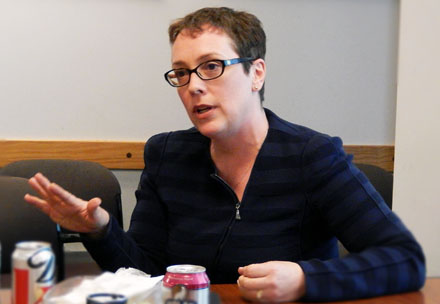
April 22, 2014 – Ever since the Snowden leaks, the NSA revelations, and most recently the Heartbleed bug, Internet privacy and online surveillance have moved to the forefront of any conversation involving technology. In the midst of constant tracking and data mining from both the commercial and government spheres, is the whole idea of privacy dead? To find answers, Julia Angwin, senior reporter for ProPublica, forged a trail through the latest technology advancements to find out if she could still engage online in a meaningful way, while protecting important private data. She documented the results in her new book Dragnet Nation: A Quest for Privacy, Security and Freedom in a World of Relentless Surveillance, and she shared them with the Shorenstein Center on Tuesday.
Along her “privacy journey,” Angwin found that the first thing she needed to change was her search engine. By using Google search, she had unwittingly created a search history that was “more intimate than a diary.” She switched to DuckDuckGo, which allows users to search anonymously. She also emptied her Facebook and LinkedIn profiles, and no longer uses either.
Angwin recommended using a service like Disconnect, which blocks invisible ad tracking, and HTTPS Everywhere, which encrypts all of your online communications. With these tools installed, users are more protected from “ubiquitous, indiscriminate surveillance.”
To engage in online commerce, Angwin created a fake identity, so purchases she makes online are not directly connected to her.
In the end, after spending a significant amount of time and money attempting to secure her online identity, she found that she still “had no assurance that my tools worked.” The problem is that mountains of data are being collected, but there are no limits on what companies and governments can do with that data. Also worrisome is the fact that “tools of surveillance are getting better and faster,” especially in the field of facial recognition, which Angwin predicted “will be a game changer” in the next five years.
Article and photo by Janell Sims, Shorenstein Center.

